Key takeaways:
- Understanding different types of music licenses, such as sync and mechanical licenses, is crucial for protecting artists and ensuring proper compensation.
- Licensing is essential for artists and independent labels to control music usage, create new revenue streams, and build trust with platform owners.
- Common mistakes include not reading contract details, assuming one license suffices, and rushing to publish without proper licenses, which can lead to legal issues.
- Effective communication, networking, and flexibility in negotiations are key strategies for successful music licensing.
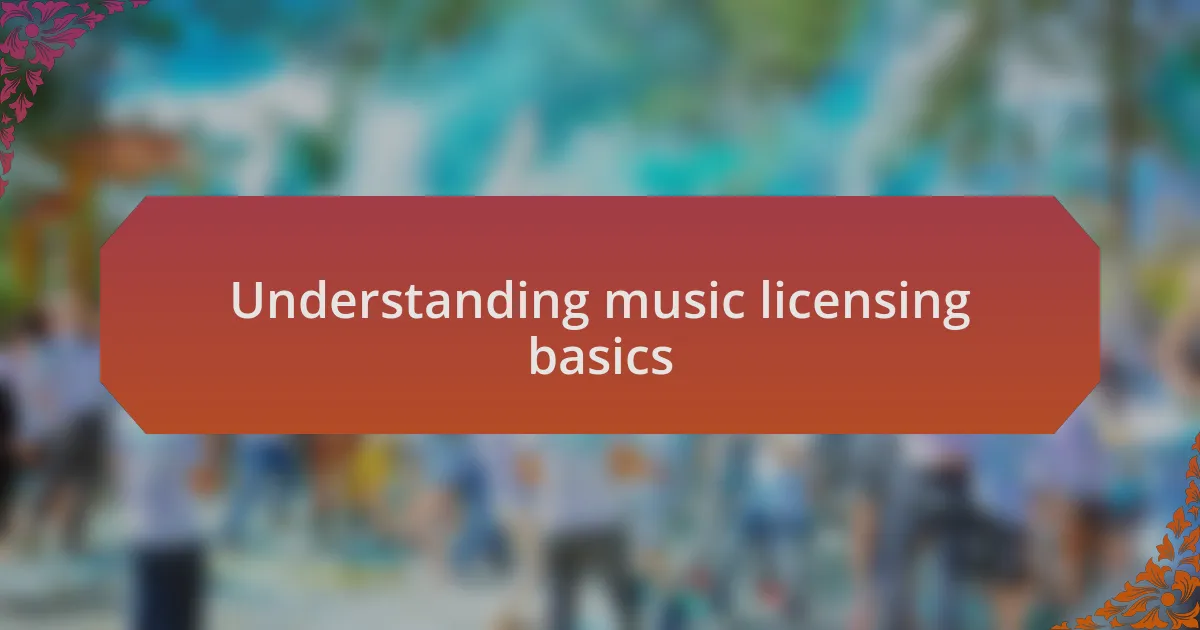
Understanding music licensing basics
Music licensing can feel like a maze, but understanding the basics makes it much more manageable. I remember when I first navigated these waters; I was overwhelmed by the different types of licenses available. There’s the blanket license, which allows access to an entire catalog, and the sync license, specifically for pairing music with visuals – each serving unique purposes.
Consider how you would feel if your song was played in a commercial without your permission. Licensing ensures that artists receive credit and compensation for their work. It’s not just a legal requirement; it’s a foundational aspect that respects the creative spirit behind music. Think of licensing as a way to protect your artistry while also opening doors for collaboration and exposure.
The world of music licensing also includes terms like Performance Rights Organizations (PROs), which collect royalties on behalf of artists. When I joined a PRO, it was an eye-opener to see how many avenues there are for earning from my music. Have you thought about how your music can generate revenue even when you’re not actively promoting it? That realization can be both exciting and empowering, highlighting just how crucial it is to embrace licensing fully.
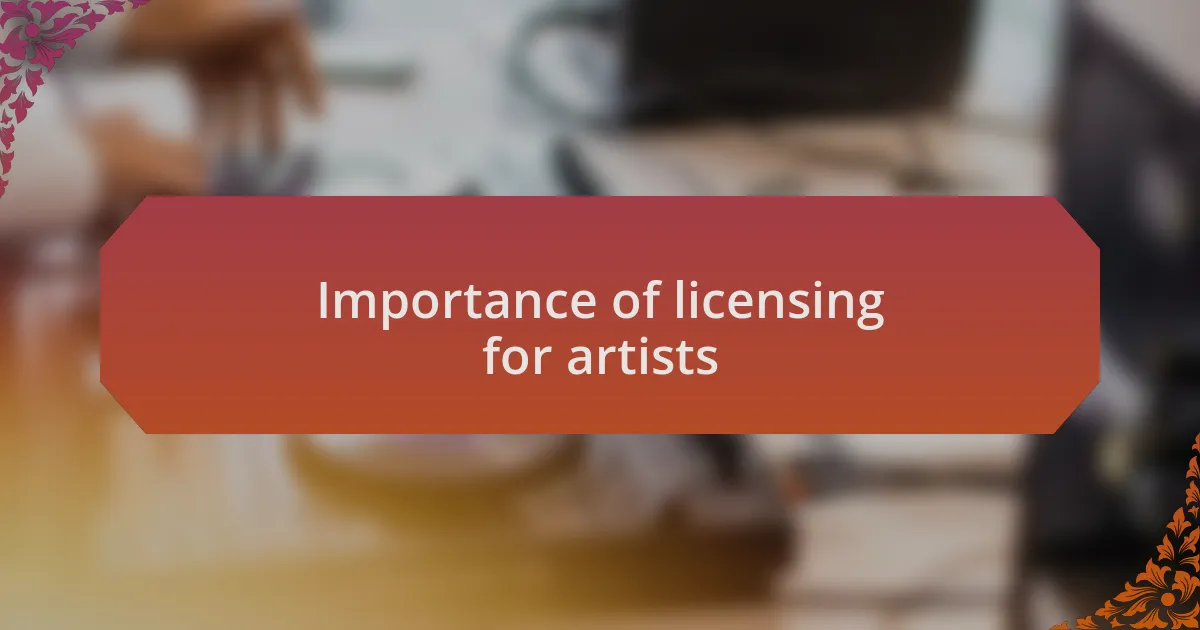
Importance of licensing for artists
The importance of licensing for artists cannot be overstated. I once released a track that quickly gained traction online, feeling proud until I learned that someone had used it without my permission in a YouTube video. It was a harsh lesson that spotlighted how licensing isn’t just a formality; it’s essential for controlling how your music is used and ensuring you’re rightfully compensated.
Every time my song is streamed or performed, I feel a sense of validation, knowing I have the legal backing to protect my work. Licensing provides artists the confidence to share their creativity, knowing that they won’t be exploited. Have you ever felt apprehensive about sharing your music? Licensing can alleviate that fear, securing your rights and paving the way for fair collaborations.
Additionally, understanding licensing opens avenues for new revenue streams, which can sometimes surprise you. I recall discovering that licensing my song for a small indie film brought in more royalties than I anticipated and even connected me with other creatives. It’s amazing to think about how something so technical can foster those relationships and bolster your career. Are you ready to dig deeper into the licensing world and discover its potential for your artistic journey?
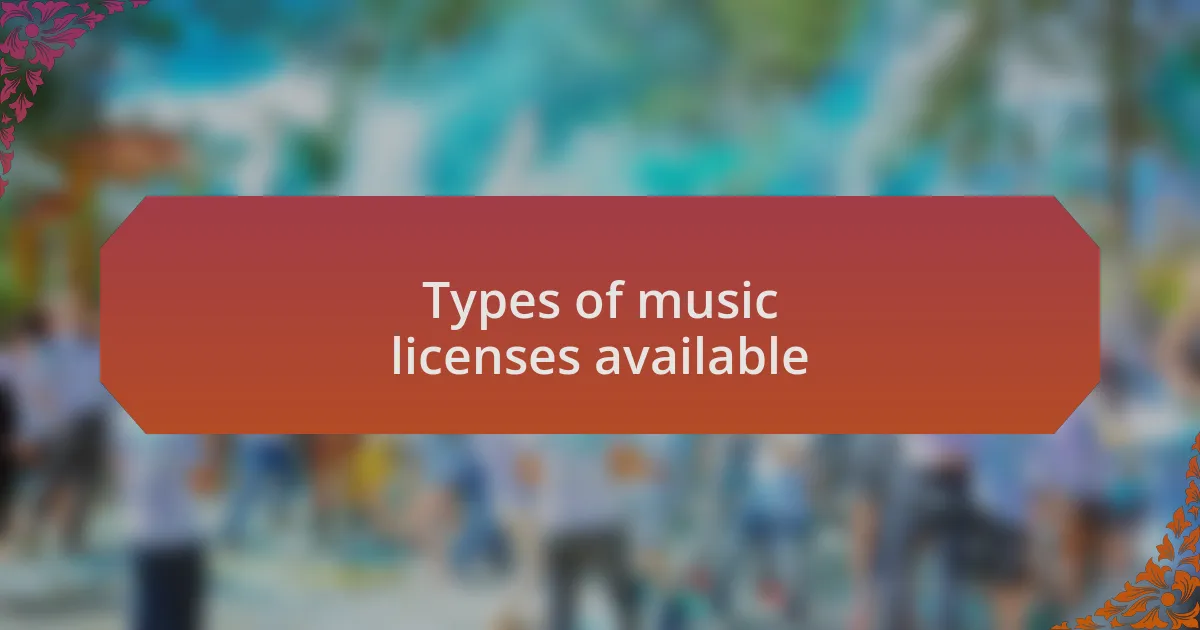
Types of music licenses available
When I first delved into the world of music licensing, I quickly realized there are various types to consider, each serving different purposes. For instance, a synchronization license is essential if you want your music featured in films, TV shows, or commercials. I remember getting my first synch license; it felt surreal seeing my song played on screen.
Another key type is the mechanical license, which applies when your music is reproduced on physical formats or digital downloads. I learned this the hard way when a vinyl label expressed interest in my album but needed assurance that all licensing was in order. It was a wake-up call about the nuances of reproduction rights, something often overlooked until you’re faced with a tangible opportunity.
Lastly, public performance licenses come into play for live performances and any public event where your music will be aired. I distinctly remember the rush of my first live gig; I had to ensure all the legal aspects were squared away with performance rights organizations. Without that, I’d have been playing in a legal gray area, risking a potential fine or worse. Isn’t it reassuring to know that getting the right licenses can protect not just your music but also your passion?
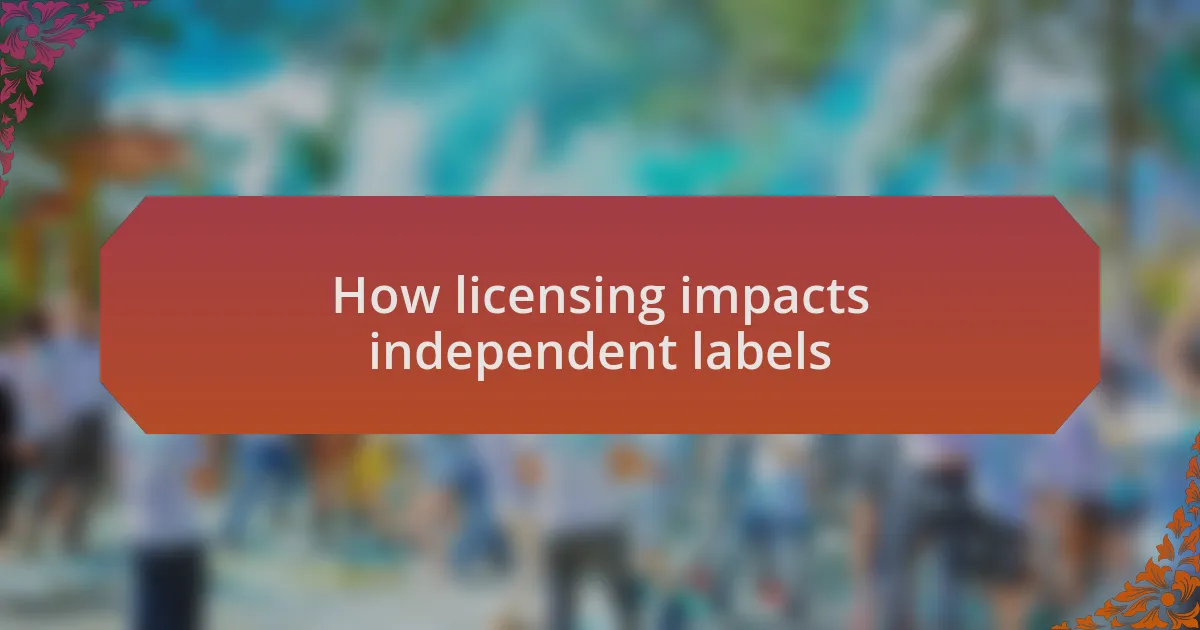
How licensing impacts independent labels
Licensing can significantly shape the trajectory of an independent label. When I was finalizing a deal with a local venue, I suddenly grasped how crucial obtaining the right public performance license was. The difference it made was staggering—not only did I secure rightful earnings for my artists, but I also built trust with venue owners who appreciated our dedication to legality. It’s a classic case of how legality translates to opportunity.
Moreover, understanding synchronization licenses can open doors for independent labels that might otherwise remain closed. I remember my excitement during a pitch meeting when I successfully showcased how one of our tracks could elevate a short film. That sync license not only provided a revenue stream but also put our music in front of an audience we could have never reached otherwise. It’s this kind of strategic thinking that can amplify an independent label’s reach and impact.
On the flip side, inadequate licensing can lead to issues that could jeopardize an independent label’s reputation. Early in my career, I underestimated the importance of securing mechanical licenses for my productions and found myself in a tough spot when a song I released caught unexpected attention. I felt the panic set in as I navigated the complex world of copyright. It’s a reminder that overlooking licensing can turn an exciting moment into a legal nightmare, emphasizing that preparation is key for sustainable growth.
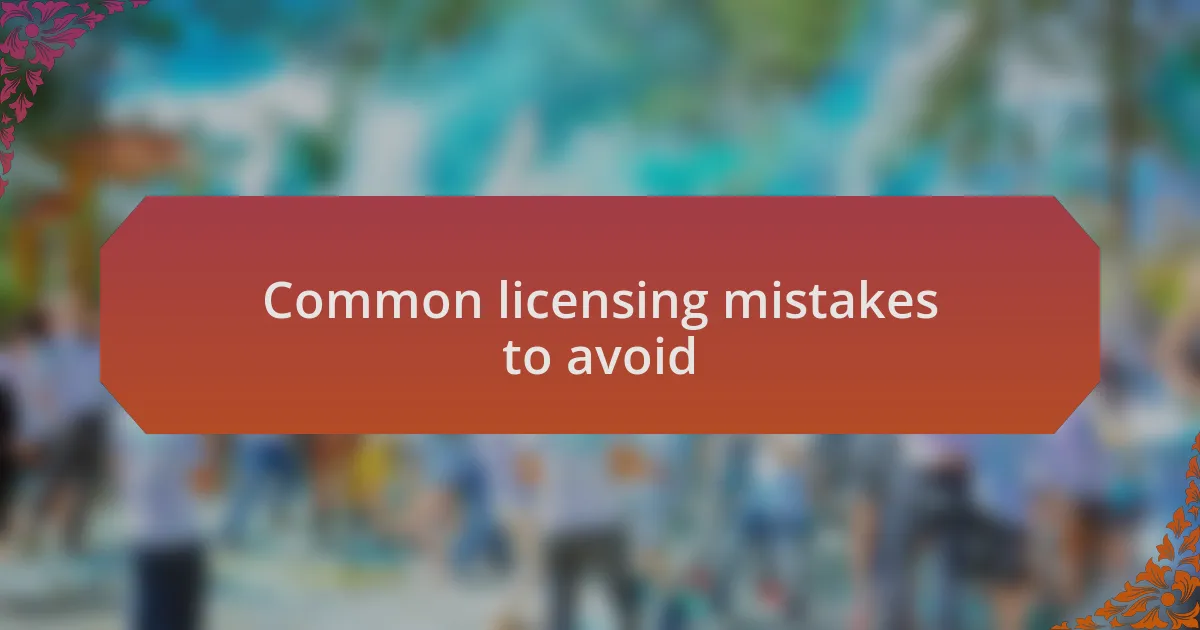
Common licensing mistakes to avoid
One common mistake is failing to read the fine print of licensing agreements. I remember the time I skimmed over a contract, thinking the terms were straightforward. It wasn’t until later that I realized the limitations placed on our distribution rights, which hindered our ability to release music on specific platforms. It taught me that diligent attention to detail can save you from unexpected complications down the road.
Another pitfall is assuming that one license covers all aspects of music usage. In my early days, I was caught off guard when a track I thought was clear for online streaming suddenly brought in claims for mechanical royalties. This lapse in understanding various license types cost me both time and money, highlighting how each license serves a unique purpose in the broader distribution strategy.
Lastly, rushing to publish without securing the necessary licenses can appear tempting but often leads to dire consequences. I had a friend who, eager to showcase his latest single, uploaded it without proper clearance. The fallout was immediate, facing takedown notices and damaging his credibility in the community. This experience reinforced the importance of patience; it’s crucial to ensure everything is legally sound before making that big splash. Have you ever considered the long-term effects of hasty decisions in your musical journey? I know I never will again.
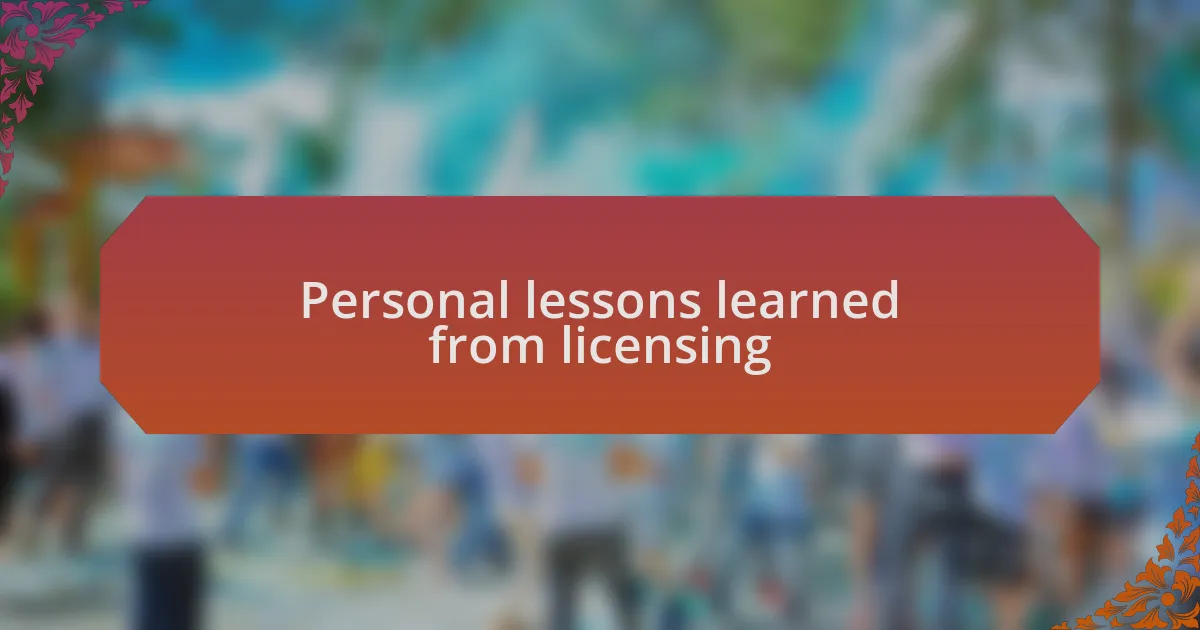
Personal lessons learned from licensing
Navigating the world of licensing can be quite a journey, one that often comes with its share of lessons. I vividly recall a moment when I was negotiating a sync license for one of my tracks. I felt confident in my approach, but I didn’t fully grasp the implications of exclusive rights. When I discovered that I had effectively locked my song into a single project, preventing other potential opportunities, it hit me hard. Have you ever felt like you were leaving money on the table? It’s a stark reminder of how each decision can significantly shape our paths.
One of the most surprising lessons for me was around the importance of timing. Early on, I underestimated how crucial it was to start the licensing process well in advance of a release date. I found myself scrambling to secure approvals while managing promotions, and it added unnecessary stress to an otherwise exciting moment. Why rush when proper planning can lead to a smoother rollout? This experience taught me that patience and foresight can create a better environment for creativity to flourish.
Additionally, I once assumed that working with a licensing agent would relieve me of the burden of understanding the details myself. While they provide valuable expertise, I learned it’s imperative to stay informed about the nuances of each agreement. After my agent miscommunicated a key term, I ended up with restrictions that limited our creative freedom. It made me wonder how often we lean too heavily on others without doing our own due diligence. Each lesson reminds me to stay engaged and informed—both for my own benefit and the success of my projects.
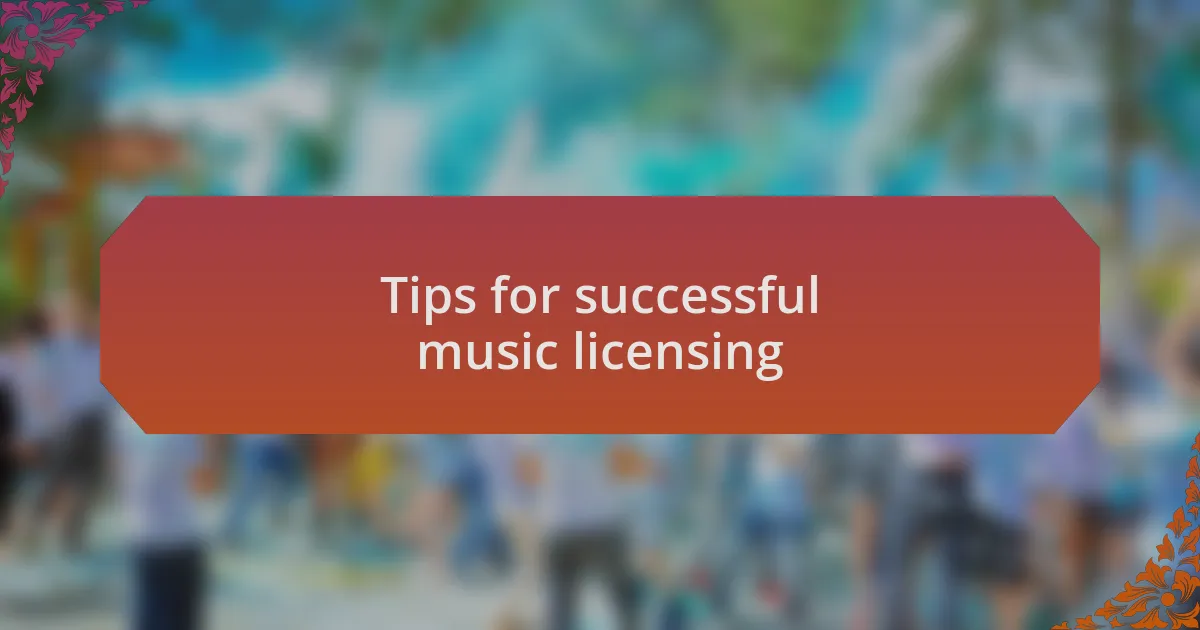
Tips for successful music licensing
When diving into music licensing, I’ve found that clarity in communication can save a lot of headaches. I remember a time when I sent out my music without specifying the rights available, and it led to confusion down the line. Isn’t it frustrating when miscommunication derails a potential deal? I now make it a point to clearly outline what I’m offering and what I expect in return. This step has been crucial in ensuring that all parties are on the same page.
Another tip that transformed my approach is the importance of building relationships. Networking within the industry was something I initially overlooked, but after attending a few conferences, I saw the profound impact it can have on licensing opportunities. I struck a deal simply by connecting with someone over coffee—can you believe it? My advice is to attend events, engage on social media, and nurture those connections. It isn’t always about the music; often, it’s about who you know and how you relate to them.
Lastly, be flexible and open to negotiations. A tough pill to swallow for me was when I had to make adjustments to my licensing fee during discussions. At first, I felt like I was undervaluing my work, but I soon realized that compromising could lead to bigger rewards down the line. Have you ever found that being adaptable opens more doors than standing firm? Embracing flexibility can not only foster better relationships but also lead to scenarios where both parties feel valued, ultimately enhancing the chances of future collaborations.